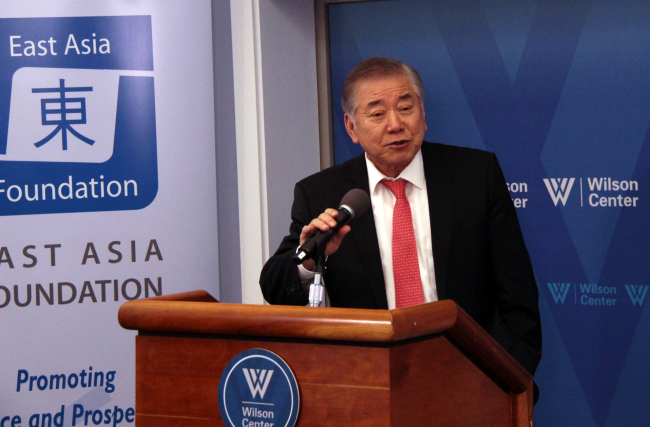A series of foreign policy and security fiascos are posing a threat to President Moon Jae-in’s diplomacy, with internal discords on North Korea, a US missile shield and guest receptions spilling over into Washington ties just 10 days ahead of his first summit.
A sense of doubt has been seeping out of Washington since the liberal administration unveiled a surprise announcement on June 5 that it will cease the deployment of the US’ Terminal High Altitude Area Defense launchers here.
The decision prompted US President Donald Trump to react with “fury” during his talks on June 8 with Secretary of State Rex Tillerson and Defense Secretary Jim Mattis, Yonhap News Agency reported Monday, citing an unnamed top Seoul official.
 |
Moon Chung-in, presidential adviser on unification, speaks at a seminar in Washington on Friday. (Yonhap) |
The report came days after Moon Chung-in, the presidential adviser on unification, foreign affairs and security, said at a seminar in Washington on Friday that if North Korea suspends its nuclear and missile activities, the South may consult with the US on “scaling down” joint exercises. The Yonsei University professor also said the president “has in mind” that Seoul could scale back the deployment of US strategic weapons here.
Faced with a backlash at home and in Washington, Cheong Wa Dae rushed to downplay Moon’s comments. The presidential office has warned him that such remarks “would not help with South Korea-US relations going forward,” a senior official told reporters Monday, calling it “his personal views.”
But Cheong Wa Dae’s move prompted others to scratch their heads. At a televised debate hosted on April 27 by the Korea Broadcasting Journalists Club, then presidential candidate Moon Jae-in himself floated the idea, saying Seoul could “adjust and downsize” the joint drills as a “corresponding step” to the North’s nuclear moratorium.
Last Thursday, the president also said at a ceremony marking the 17th anniversary for a watershed inter-Korean peace declaration that he would pursue talks with Pyongyang if it halts nuclear and missile tests. He even displayed his willingness to hold parallel negotiations on denuclearization and a peace treaty, and floated the normalization of North Korea-US relations in return for a moratorium on weapons experiments.
The speech took many by surprise as it represents a sweeping shift in South Korea’s position toward the parallel talks which Beijing has repeated calls for but Seoul and Washington have brushed off.
The mix-up in Cheong Wa Dae’s messages appears to be intensifying concerns that Moon and Trump may clash in coordinating their approaches toward Pyongyang during the summit, with the former seeking to reopen dialogue and the latter calling for maximum sanctions and pressure until the Kim Jong-un regime makes a meaningful commitment to denuclearize.
The Moon administration had been widely forecast to move to launch a peace offensive toward Pyongyang after policy coordination with Washington, with the Aug. 15 Liberation Day being a possible occasion.
“The series of messages the government has been sending out to not only the US and the North is somehow lacking coherence. An early summit with Trump is desirable, but without sufficient preparations and coordination, it could result in a failure as before,” a Seoul official said, referring to a 2001 summit between then President Kim Dae-jung and his US counterpart George W. Bush.
Another official displayed worries that the leadership may be “pushing things too fast” before a comprehensive review is carried out to map out a policy framework alongside a concrete strategy with which to convince the Trump administration.
Signs of unease have been growing further around Washington, especially after accusations surfaced that Moon refused to meet with visiting congressional leaders last month who may play a key role in setting the tone for the summit.
Republican John McCain, chairman of the Senate Armed Services Committee, was found to have called off a stop in Seoul as part of his Asia tour, after a planned meeting with Moon fell apart. Other top Republicans, such as Mac Thornberry, chairman the House Armed Services Committee, and Cory Gardner, chairman of the Senate Foreign Relations Subcommittee on East Asia, failed to visit Moon during their respective stays here.
All of the three politicians, in contrast, met with Hong Seok-hyun, former chairman of JoongAng Media Network, during his trip to Washington earlier that month as Moon’s special envoy.
A Cheong Wa Dae official dismissed the accusations as “groundless,” saying Monday that the sides had scheduling difficulties. Moon did receive Senate Democratic Whip Dick Durbin, while National Security Office chief Chung Eui-yong held separate discussions with Thornberry and Gardner instead.
By Shin Hyon-hee (
heeshin@heraldcorp.com)








![[Today’s K-pop] Blackpink’s Jennie, Lisa invited to Coachella as solo acts](http://res.heraldm.com/phpwas/restmb_idxmake.php?idx=644&simg=/content/image/2024/11/21/20241121050099_0.jpg)